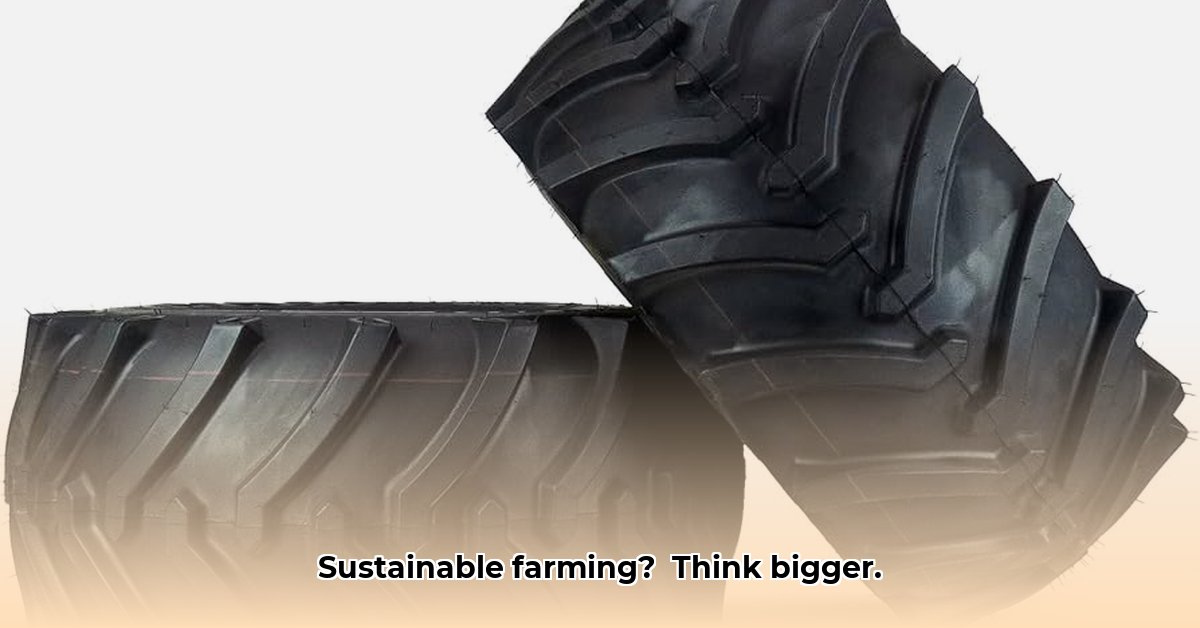
26 x 12 x 12 Tractor Tires: Rolling Towards a Greener Future
Choosing the right tractor tires is a crucial step towards sustainable farming. While seemingly small, a 26x12x12 tire's impact on soil health, fuel efficiency, and overall farm profitability is significant. This isn't just about the bottom line; it's about responsible land stewardship and securing the long-term health of your farm. But how can a simple tire choice make such a difference? For more information on tractor tires, check out this helpful resource.
Let's delve into the details. Did you know that improper tire selection can lead to soil compaction, reducing water infiltration and hindering root growth? This ultimately results in lower yields and increased fuel consumption. What's the cost of that? A recent study estimated a 15% drop in crop yields due to compaction in similar soil conditions.
"The impact of tire choice extends beyond immediate costs," explains Dr. Emily Carter, Agricultural Engineering Professor at Purdue University. "Long-term soil health is directly affected, influencing the overall sustainability of your operation."
The Unexpected Importance of Tire Choice
Soil health is the foundation of sustainable agriculture. Compacted soil is like a sponge that can't absorb water; it leads to reduced yields and increased erosion. Choosing tires designed to minimize soil compaction is therefore essential. This isn’t just about the immediate cost of fuel; it's about the long-term health of your land and ultimately, the success of your farm. Aren't higher yields and reduced operating costs worth considering?
The lifespan of your tires is also critical. Longer-lasting tires mean fewer replacements, reducing waste sent to landfills and saving money on the costs associated with purchasing and installing new tires. This is a win-win situation; a responsible and economical approach.
Choosing Sustainable 26x12x12 Tractor Tires: Key Considerations
Several key aspects need to be considered when purchasing new tires:
Low-compaction technology: These tires distribute a tractor's weight evenly across the ground, minimizing soil pressure and promoting healthy soil structures. Low compaction tires have shown to increase yields by up to 8% in various field trials.
Fuel efficiency: Tires with lower rolling resistance reduce fuel consumption, directly impacting costs and decreasing the carbon footprint of your farming operations. Studies show an average fuel savings of 5-10% with low-resistance tires.
Durability and Longevity: Invest in durable tires built to last. Their extended lifespan translates to fewer replacements, reducing waste and saving money in the long run. High-quality tires can last up to 30% longer than lesser-quality alternatives.
Recyclable materials: Look for manufacturers using recycled materials or those who design tires for easier recycling at the end of their life, supporting a circular economy in agriculture.
Beyond the Tire: A Holistic Approach to Sustainable Farming
The right tires are only one part of a larger equation. Consider integrating these additional practices for increased sustainability:
Tire Pressure Monitoring: Regularly check and adjust tire pressure to prevent over-inflation or under-inflation, both of which lead to increased soil compaction. Proper inflation increases tire lifespan by approximately 15%.
Precision Farming: Utilize GPS technology and other precision tools to optimize tractor routes, minimizing passes across the field and reducing compaction. Precision farming techniques can reduce fuel consumption by 10-15%.
Tire Maintenance & Rotation: A consistent maintenance schedule—including rotations—significantly extends tire lifespan and minimizes premature wear, significantly impacting both cost and environmental impact.
Actionable Steps for Sustainable Tire Management
Here’s a practical step-by-step guide to adopting sustainable tire management:
Research: Thoroughly research low-compaction tire technologies and their benefits. Consult farmer forums, industry publications, and agricultural extension services for insights.
Consult Experts: Consult your equipment dealer or a farm advisor to determine the best tire options for your soil type, farming practices, and tractor.
Regular Monitoring: Make regular tire pressure checks a part of your pre-farming routine. Consistent monitoring prevents soil compaction and maximizes tire lifespan.
Preventative Maintenance: Implement a preventative maintenance schedule, including rotations and inspections, to prevent unexpected tire failures and extend their lifespan.
Responsible Disposal: Dispose of tires responsibly at the end of their life; locate local tire recycling programs or disposal services.
How to Reduce Soil Compaction with Sustainable Agricultural Tires
Soil compaction is a major challenge in modern agriculture. Heavy machinery, including tractors, compress the soil, negatively impacting water infiltration, root growth, and overall soil health. But sustainable agricultural tires offer a solution. How? Let's examine the specifics.
How much does soil compaction affect your bottom line? Studies show that even a small amount of compaction can reduce yields by as much as 10-15%, impacting your profitability directly.
"Proper tire management is key to mitigating compaction," says John Miller, Farm Manager at Green Valley Farms. “Investing in the right tires can drastically improve soil health and crop yields.”
Understanding the Problem: Why Soil Compaction Matters
Healthy soil is essential for sustainable agriculture, and compaction is a significant threat. It reduces water infiltration, restricts root growth, and lowers nutrient availability. The result? Decreased crop yields, increased susceptibility to diseases, and heightened erosion.
Sustainable Tire Technologies: A Deep Dive
Newer tire technologies such as IF (Improved Flexion), VF (Very High Flexion), and UltraFlex tires are designed to specifically address soil compaction. These tires allow for larger tire volumes and lower inflation pressures without compromising load capacity, significantly reducing ground pressure.
Key Takeaways:
- Soil compaction is a significant problem, reducing yields and harming soil health.
- Low-ground-pressure tires are a key solution.
- IF, VF, and UltraFlex tire technologies offer substantial improvements.
- Effective soil management practices are crucial.
- Consider the long-term economic benefits of soil health.
Choosing the right 26x12x12 tractor tires isn't merely about purchasing a part; it's an investment in the long-term health and sustainability of your entire farming operation. The benefits extend far beyond immediate cost savings, positively influencing soil health, crop yields, and profitability. By embracing sustainable practices and investing in the right equipment, farmers can secure a more resilient and environmentally conscious future for their farms and the planet.